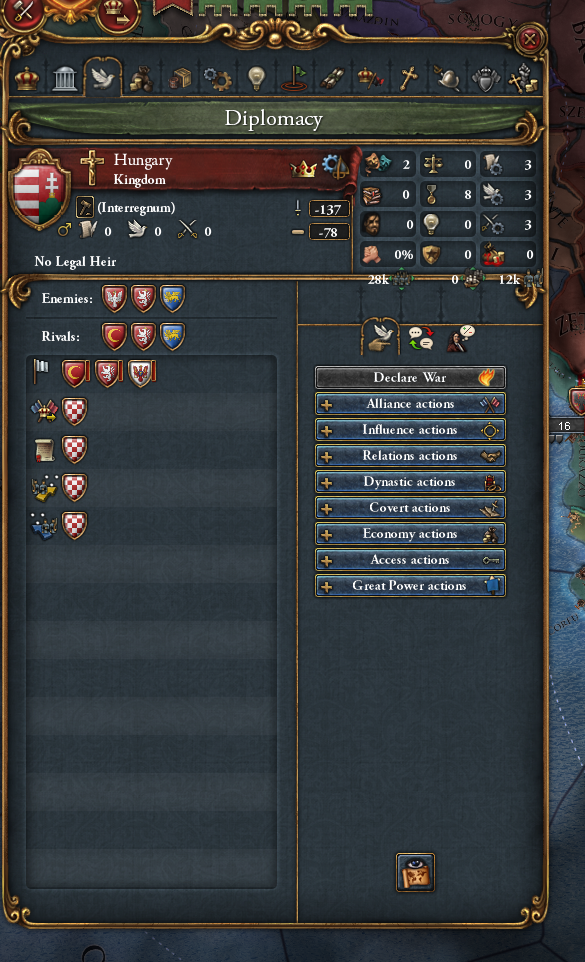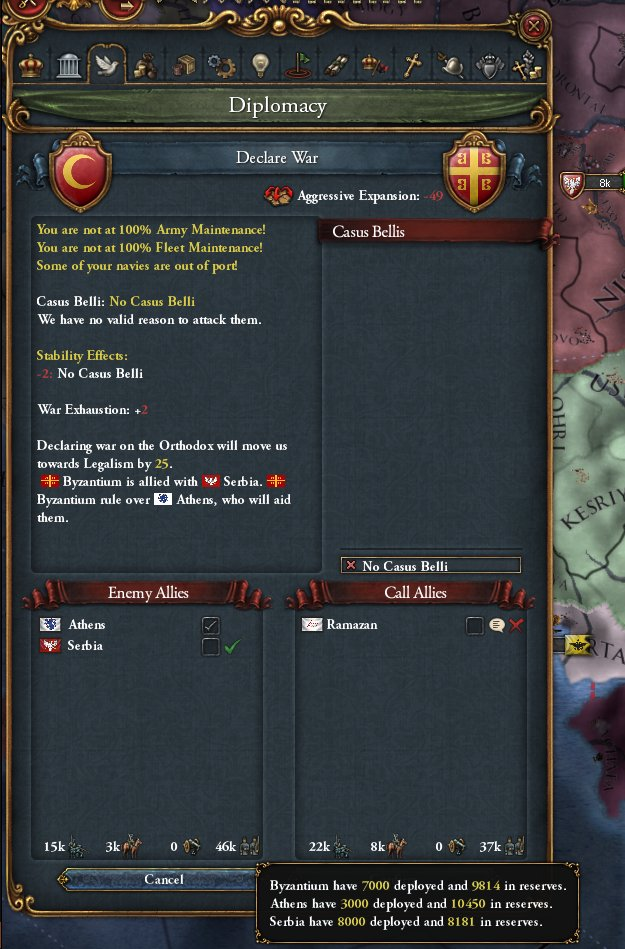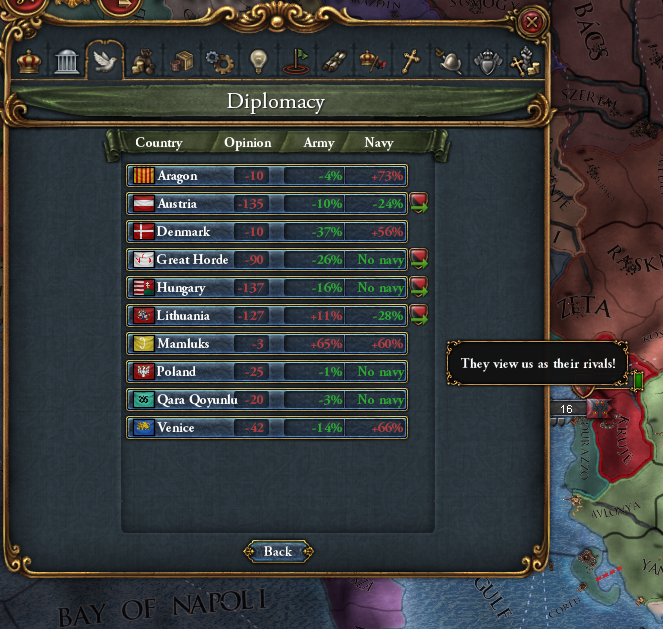Hey again! So I know the last development diary I said that the next one wouldn’t be coming until 4th of February, and if you check your calendar it is still not yet 4th of February. However we’ve gotten to a point of 1.30 where we feel we can more regularly provide development diaries again. So for this one I will be visiting an old favorite though before we dig into new features that are going to be coming with the upcoming expansion and patch. Features made just to make the game simply better, quality of life.
I will warn you though, a lot of the UI you are about to see is very much work in progress and is not representative of how it will look upon release.

First up we’ve made information about other countries' military strength more readily available to the player. It has always been possible to discern this information in the ledger, and it will still be available there, but we’ve also now placed it in two interfaces that you might look at a bit more often. First is the Diplomacy View where below the usual information you can discern of a country. Here it will list specific the land forces and the naval forces fielded and last the manpower of the country.

Then we have the War Declaration view, this one is a bit more complicated. It will sum up the infantry, cavalry and artillery of each side that will be called in to the war. The last column is the full amount of forces deployed and the amount of manpower available to that side. You can see the breakdown of these numbers for each called nation by hovering over each number.
These values are hidden if you are playing with limited or locked ledger in multiplayer. But they will show up if you have infiltrated administration in a nation. In the case of the War Declaration screen it will show incomplete numbers but also warn you of this unless you have infiltrated every member of the opposing sides governments.

Next is a little handy thing just to help you pick your rivals a little bit better. Each option when picking your rivals will now highlight if that country has also picked you as their rival.

We’ve made endgame tags optional now. You can turn it off in the options before starting a campaign. It does however invalidate achievements.

Last thing is on events that affect a specific location in the world. We’ve added some nifty buttons, these will take you directly to the province that the event is concerning. Making it a lot easier to get a grasp on what you are getting where. Image shown here is an example with a banner in the top which will be used for if the entire event affects a single province while the one on an event option is for if there’s a difference between the options.
I also want to update you on that since last dev diary I and Johan have listened to responses and based on that feedback done some balance changes. Courthouse and Town Hall reduces governing cost -25% and -50% respectively. We've added State House which uses a manufactory slot and gives -20% governing cost and -5% minimum autonomy on entire area with double effect on provinces of paper, gem or glass. They can only be built one per area. Merchant Republics and Prussian Monarchies penalties are now based on Governing Capacity instead of amount of provinces. They will also as a base have less Governing Capacity available to them.
We've also changed the requirements for making a province part of Trade Companies, there are no longer any religious requirements, it only requires the province to not be in your super region. This means Russia can make Siberia into a TC if they so want to. Their autonomy penalty have been changed to 90%, however they have only 45% production efficiency loss from autonomy and no penalty on naval FL. Propagation of Religion available to Muslims have been limited to anywhere but Europe.
That’s it for today's dev diary. Next one will come next week and will be written by Johan about a new upcoming feature part of the expansion focusing on making conquest more rewarding.
I will warn you though, a lot of the UI you are about to see is very much work in progress and is not representative of how it will look upon release.

First up we’ve made information about other countries' military strength more readily available to the player. It has always been possible to discern this information in the ledger, and it will still be available there, but we’ve also now placed it in two interfaces that you might look at a bit more often. First is the Diplomacy View where below the usual information you can discern of a country. Here it will list specific the land forces and the naval forces fielded and last the manpower of the country.

Then we have the War Declaration view, this one is a bit more complicated. It will sum up the infantry, cavalry and artillery of each side that will be called in to the war. The last column is the full amount of forces deployed and the amount of manpower available to that side. You can see the breakdown of these numbers for each called nation by hovering over each number.
These values are hidden if you are playing with limited or locked ledger in multiplayer. But they will show up if you have infiltrated administration in a nation. In the case of the War Declaration screen it will show incomplete numbers but also warn you of this unless you have infiltrated every member of the opposing sides governments.

Next is a little handy thing just to help you pick your rivals a little bit better. Each option when picking your rivals will now highlight if that country has also picked you as their rival.

We’ve made endgame tags optional now. You can turn it off in the options before starting a campaign. It does however invalidate achievements.

Last thing is on events that affect a specific location in the world. We’ve added some nifty buttons, these will take you directly to the province that the event is concerning. Making it a lot easier to get a grasp on what you are getting where. Image shown here is an example with a banner in the top which will be used for if the entire event affects a single province while the one on an event option is for if there’s a difference between the options.
I also want to update you on that since last dev diary I and Johan have listened to responses and based on that feedback done some balance changes. Courthouse and Town Hall reduces governing cost -25% and -50% respectively. We've added State House which uses a manufactory slot and gives -20% governing cost and -5% minimum autonomy on entire area with double effect on provinces of paper, gem or glass. They can only be built one per area. Merchant Republics and Prussian Monarchies penalties are now based on Governing Capacity instead of amount of provinces. They will also as a base have less Governing Capacity available to them.
We've also changed the requirements for making a province part of Trade Companies, there are no longer any religious requirements, it only requires the province to not be in your super region. This means Russia can make Siberia into a TC if they so want to. Their autonomy penalty have been changed to 90%, however they have only 45% production efficiency loss from autonomy and no penalty on naval FL. Propagation of Religion available to Muslims have been limited to anywhere but Europe.
That’s it for today's dev diary. Next one will come next week and will be written by Johan about a new upcoming feature part of the expansion focusing on making conquest more rewarding.

